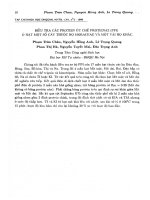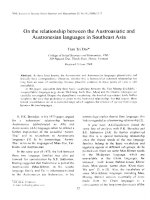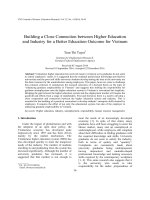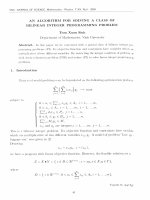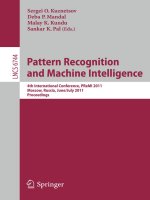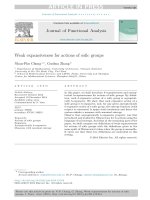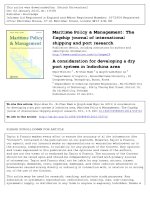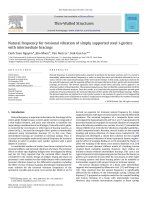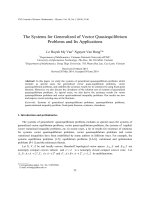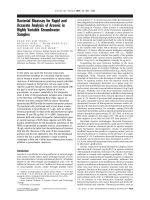DSpace at VNU: Building System for Simulation of Dynamics and Pollution Transport in Shallow Basins
Bạn đang xem bản rút gọn của tài liệu. Xem và tải ngay bản đầy đủ của tài liệu tại đây (5.42 MB, 10 trang )
10
Pham Tran ChaUf Nguyen Hong Anh, Le Trong Quang, . .
TAP CHÍ KHOA HOC ĐHQGHN. KHTN, t.x v . n°3 - 1999
ĐIỀƯ TRA CÁC PROTEIN ỨC CHỄ PROTEINAZ (PPI)
o HẠT MỘT SÓ CÂY THƯỘC HỌ MORACEAE VÀ MỘT VÀI HỌ KHÁC.
P h a m T râ n C h â u , N g u y ễ n H ồng A n h , Lê T rong Q u an g
P h a n T h ị H à , N g u y ễ n T u y ế t M ai, Đ ào T rọ n g A n h
7>uíjg Tàin Công nghệ Sinh bọc
Đại học K H T ụ nhiên - ĐHQG Hầ Nộí
Chúng tôi đã tiếu hàiih điều tra sa bộ PPI của 17 mẫu hạt thuộc các họ Dâii tằiu,
Bỏng, Siiu, Bồ hòn, Tliị và Na. Tioiig đó 4 uiẫu hạt Mít rnật, Mít dai, Roi, Đậu bắp có
chứa cả chất ức chế tripxiii và kiinotripxiu. Năiu niẫu hạt khác: Chay, Mít tố nữ, Hồiig
đỏ, Na có chứa TI hoặc KI. Tír các kết quả trên cúng tôi đà cliọii hạt Mít luật và Mít dai
để nghiên cứu tiếp. Kết quả điệu di dịch chiết hạt 2 Iiiẫiỉ Mít mật và Mít dai cho thấy
pliổ điệii di proteiii 2 mẫu Iiày khá giống uhau, trừ băiig protein có Riu = 0.39 (Mít dai
kliỏiig có băug proteiii uày). Phải cliăiig băng proteiii trên qưi định Hự sai khác giữa Mít
m ật và Mít dai. sắc ký qua cột Sephadex G75 cũiig cho thấy phổ sắc kí 2 mẫu này khá
giống nhau gồm 2 đỉiih protein chính, troug đó đỉnh tliứ Iihất có cả KIA và TIA uhưng
ờ mức độ thấp liơii. TI và KI từ hạt luít khá bều vói uliiột, sau khi sử Iv ờ 100'^c trong
15 phút, hoạt độ kìm hãin chỉ còn lại khoảng 30 % so với hoạt độ ban đầu.
VNU. JOURNAL OF SCIENCE. Nat. Sci., t.x v . n^3 - 1999
BUILDING SYSTEM FOR SIMULATION OF DYNAM ICS
A N D POLLUTION TRANSPORT IN SHALLOW BASINS*
P h a m V an H u a n
o f Hydrometeorology and Ocemiography
College o f Nat lira! Scieiices - VNU
F ã C ììIty
A b s tr a c t. The tvjo-dimension models for the dynarmcal processes and conservative
substance transport in the sea based on the systems of differential equations of long
wave propagation in shallovj water and diffusion equation integrated over the depth
are summarized, ỉn order to apply these models to the shallow basins of real complex
shape and bathymetry the equations were solved numerically using a simple explicit
scheme. All the processes of computation of the water dynamic parameters and substaĩice concentrations are integrated into a computer program that allows undertake
calculations for arbitrary domains in coastal zone. The experiments with different ge
ographical objects point out that in conditions of restricted initial data or full lack of
them the simple two-dimension models lead to the some interesting features and quan
titative characteristics in dynamic and pollutant distribution regime of basins that are
sufficient to different decisions both in level of investigation and in designs.
Nowadays Iiiany technical activities relate to the coastal regions and uoar-sliore
basins and the Iiood for oiivironiiiciit protection in these cloniains rapidly increases. This
all luakos ougiiicers and designers in their works must loarn Hindi about the dynamic
characteristics and processes of pollution transport there. At the same time for almost
K'gioiis along oiir sea shore the observed data is g;ciicral not available aiicl the works for
obtaining them arc very oxpoiisivo. The liuiucrical leaiizatiou of inatlieiiiatical luodcLs
of those piocosscs is a choap way to get some initial iiiforiuatioii for difForoiit, ilcsigiiing
decisions. This paper presents some experiences ou the application of inathomatical models
of long wave iuducod circulation and the inodol of polhitaiit transport for difFcrcnt shallow
basins. The purpose of our work was to build a systoiii of computer programs to facilitate
tho calculation of cm rout tiold or, .siiimltaiieonsly, of the curroiit field and field of pollut ant
conci'iitratioii ill a coastal basin with its complex real coastiiiio and bathviiietrv. The
Kvsnlts of cxporiiuoiits with diffcrout regions of interest coufinii the cfficieiicv of the systrni
both at diagnostic and prognostic loveL
The circulatiou in coastal areas is coimuonly generated aiid sustained by various
factors such as the tide, the wind or atmospheric prossiiro acting oil tliO water surface aiiil
*) This work is a result of the them e 7.8.11 "T h e system of currents in the west of South-china sea
and its im pact on the natural conditions of Vietnam coastal" (Basic Research Program , T h e Earth Sciences
1998-1999).
12
P h a m Van Huan
by the variation of water density ill space of the considered douiaiu. The mathematical
niodoLs for these typos of circulation well developed ill coastal eiigiiicoring (see [2,3,4]) and
experioiicc of practical use of tliesc models can be found ill our couiitrv [1,5]. Various
uuiuerical schciiies for the solution may be found in literature. To yield the current field
used when calculating the concentration field of a pollutant wo applied two models: model
of long wave induced circulation (tidal model) aiid model of wind generated circulation.
1. Two - diincnsioii circiilatioii models
The circulation geucratiiig factor is a periodic perturbation of the free surfacc ele
vation arriving from the open sea. So the circulation iu this case is called tide- iuduced
circulation. The iiitegiatioii of Reinolds equations of inovoiiieiit and equation of continu
ity over the depth, tlic approximation of the uoii-lineai convective terms by their depth
mean values and using the quadratic form for the bed friction result in a following simple
two-dimensioii horizoutal tidal flow model [3]:
( 1)
( 2)
d ị ^ d{H + QU _ d{H + Ẹ)V
dt
dx
dx
u.
(3)
whore
V deptli-avcragod cvirreiit components along axes
- elovatioii (tide head);
H - soa depth;
-Cliozy bod friction coefficient; p - water dcnsitv; f - time; / - Coriolis
paiainctor, / = 2usiuif ( U) - angle speed of th r E arth rotation, ip - mean latitude of tho
computed cloniaiii).
c
If tliP vviiHỈ-gniiorat.nci r i i r m i t . is consiflnroii, t.liP v p r tir a l f lis tr ih n tin n o f vplorit.y m u s t
bo taken in the parabolic form
(4)
wlu'ic n =
- ('ddy viscosity, r , - wind stress at th r water sin face.
W ith this vortical distribution of volocity tlio equations of uiovoniout with depthaveraged velocities have the foiiiis
du
dt
(5
40 / ỠX
- 9 dy - Ị Ư + pH
V
dv_
40 / cdy
\
p
pH
(6)
Building sy stem f o r sim ulation o f dynam ics and...
13
and the equation of continuity in this case has the same form (3). If the free surface vrlocity
is required for siibsoqiiout use ill pollutant model its components call bo computed from
the equation (4 )
= l,5 i/+
=
2.
(7 )
The initial aiid bom idaiy conditions
- Initial condition:
^i=o = Ut^o ~ K=o = 0 .
(8 )
- At laud bouudaiios Gy (sea slioro or river bank) Iioniial velocity equals to zero:
U c o s a v . s i na ị cị — 0,
(9 )
w h n r a - the angle bctwooii curreiit direction anti slioioliiio oitliogonal.
- For the opoii boiuidaries Ơ 2 oue of the following conditions is applied:
a) Tlu' heights of sea lovol arc given by observed values
(
10)
b) The elevation is given by the hannoilic constants of tide constituents;
+ (^0 + '«), - ụ,
^
.=1
( 11)
c) No level cliaiigos at boundary during the calculation period:
i .
= “-
12)
(1) The long wave is ficoly radiated from the computation doiiiaiii:
Ưco.sa + v.siĩm
= ^ \ / q{H + Ỉ,)Ơ2
c) No level orthogonal giadioiit at open boundary:
ỂÍI
(13)
_n
Ỡr/ỈG2
3.
Fiiiitf difforeiico sclicincs
To solve muucncally tho goveniiiig oqiiatious of tlio above dyiiaiilic modoLs one can
use schoiues based on the finite differeucr or filiitr olomoiit Iiirtliods [2.3], We chose tlio
oxplicit finite diffoienco sclicme for the sake of simplicity.
The flow doniaiii is discretised by ail orthogonal horizontal grid with nirsh A.r. A y.
The bomiclaiios arc approxiinatod by luosli sides paiallrlod to the axos O r or Oy. The
P ham Van Huan
14
uukuowii fiinctioiis {/, V, ị are computed on characteristic locations ill a staggered way. If
the depth is given at the intersection of nicsli sides then the Ỉ/, V values refer to the center
of the inosli sides paralleled to Oy aud O x respectively and the Í value refer to the mesh
center (Figure 1).
Figure 1: Orthogonal grid for spatial and time discretisation
111 this case the finite difforcuce analogs of the equations ( 1 ) (3) for oxaiuplo have
the forms
+ ^ 5 ) '] -
8 Ax
.........................................................
+
\
2 s
V
;
J
(
i
U
«
)
^
+
{
v
;
;
- i '5 - . )
r
)
_______ Y___________________ _ I r y t i .
c
^[h „ +
Af
= v." - - ^ L
8 At/
2 q V :^ J ({ U l)y +
^
/ ; C '‘ + V 2
c '‘+ l / 2 \
^
- ÃA yí l «
,n + 3 /2 _ , n + l / 2
Sii
s
fT -jn
(ft,
Af
At
“ 2Ã Ĩ ['"■"+■
■ ''• " " ‘ ("■J + " - J - O l + 1'’^ ' ■
Uĩ, +
+ K” ,, + V"+, + K -ý + 1
''^6 ~
_
4'
’
^*7 “
+ í/;v „ + ơ "
4
with the CFL criteria of stability .^ here //nm:r - luaxiiimm depth ill the
computed doiuaiii.
(15
Building sy ste m fo r sim ulation o f d yn a m ics and...
15
4. Two - diineu^ion model for pollutant transport
(18)
c
where
- pollutant depth-mean coiiceiitratiou; Dj:,Dy- diffusion coefficients on axes
Ox,Oy ,X - decay coefficient; U, V- depth- averaged components of current ill directions
0:r,Oy computing from the system (1) - (3) an d /o r (5) - (6 ), (3). This equation is com
pleted by the following appropriate boundaxy conditions
a) At solid boundary normal flux is equal to zero:
dC
— 0 at G i.
dn
(19)
b) At open boundary
Concentration is giveii as a function of coordinates ỄUid time (in the problem of
salt intrusion):
= S { t , x , y ) at Ữ 2 -
(20)
- Or free transiiiissioii boundaiy (pollutant trap) (in the problem of pollutant traiisport):
d /
ỡ(
dc \
(21)
“
c) At the pollution sources the concentration is known and prefixed
cl
= c „ (.r ,v y ,0 .
( 22 )
5. The above inoiitioucd models had been realized by a coiuputci program which ac
cess How domain with arbitraiy coastal gooiaotry. Bellow arc prcsoatod some results of
oxiJci iniciits to show the porfomiancc of tlio build progi ani.
a)
E.rpeHvienf 1: Predicting level oscillations at river m ouths along tlio sliorpliiic of
Rod livrr delta after the tidal oscillations at opoii boundaries given (Figure 2). The results
showod the increase of the phase of sea level oscillations southward. That is closed to the
tliooif’tical pictiu'O of tidal propagation ill Tonkin gulf. The coinparisoii of level pipdictcd
by the model and that due to the tidal tabic is shown ill Figure 3.
Figure 2: Coastal zone of West Tonkin gulf (sl)owii tide gauge Hoiidan (•)
and Iiiiio river luoiiths:
1. Nam Tiicu, 2. Cua Cam, 3. Kicii An, 4. Van Uc, 5. Thai Binli
6 . T ia Ly, 7. Ba Lat, 8 . Pliu Lo, 9. NIm Tan)
Pham V an Huan
16
H ondau
0
C o n tin o u s lin e - m o d e l o u t p u t, d o te d tin e - a fte r tid a l tab le
Figure 3: Tide gauge Hoiidau:
CainpỄU isoii of levels predicted by model with the tide table
o
b)
Experiment 2: Computing tide and tidal circulation in lagoou Tra
(Central
Vietnam). The purpose of the calculation was to predict the oscillation regime of water
level and current Ú1 the lagoon when a channel connecting it with the South- chiiia sea
built. As a sequence of this dyuainic regime the intrusion of salt from the South-china
sea iiito the lagoon waters had been investigated by the pollutant transport model. The
input was tidal oscillation of water level (with the maguitude of 0.5in) and prefix salinity
35 °/ooat the seawaid end of the coniiectiug channel. At the begiiiuiiig of the simulation
the water iu the lagooii was supposed to be fresh.
5
20cm/i
5d
K
Spring tid e
m
«Ị
3S
3q
30
IS
10
9
5
I
0
t
5
a
0
»
3
0
»
«
«
5 10 1 5 » » » » . ® *
56
20
SO
«
L eap tide
40
35
30'
s:
X!
IS'
5
10
15
^
FiQure 4: Tidal cuiTCiit patterus ill Tra
o lagooii
Building sy stem f o r sim ulation o f dyn am ics and...
17
Due to results of the simulatiou the tidal current of diumal period with rnaxiiimin
velocity up to 30-50 cm /s had developed in spring tide in the north part of the lagoon
near the connecting chamiel (Figure 4). The tidal oscillation of water level in the lagoon
was of standing wave t.vpe, tliejevel oscillations ill different locations in the lagoon were
in the same phase (Figmc 5). The tidal currents strengthened the procoss
iutnision of
salty water from the soa into the lagoon. Tims after simulation for one day of variable t,
the water in a half of lagoou area had become salty or brackish. After two days of tlie
water exchange with the sea the lagoon had akriost become a marmc basiu (Figure 6 ).
JO_____15
20
25
30
35
40
^0
15
20
25
30
35
40
45
:
48 hrs from begir*ning
—1
— —1
■
n—
1
__A—
1
I--- ^------------------^
5
10
15
20
25
.
r
30
K
40-------45
^
n
'
'------- f ----------------------------------------- — ________________________
Fýĩire 6: Salinity values (7oo) at different time from tlie'begiiiimig”of “iiiiulatioii
18
P ham Van lỉu a n
c)
E.rỊìerirnent S: Coiupntiiig oil spills propagation in Ha Long Bay. The author had
used tAvotliiacnsioii Iiioclol to got. (Iviianiic picture of this basin bcfolo [l]. The staiting
place of oil slicks was near tlio Cai Lan port. Oil spills bi'caiiio to spread luidor the tideiuducod and wiiicl-griiciatod circiilatioii comỊ)iite(l by inod('l (l)-(3) and (5)-(7). The tidal
lovc'ls HCIC' givoii both at Qiiang Niiili outraiico and Hai Phong oiitiaiico of tlio Ha Long
Bay. Results of tlio siiimlation sliowod that for one tidal cilck' tlir oil spills do not spread
fai- (Figure 7). It is seen that the oil spills tciidod to tho .soutlK'a.st from tlicir starting
place.
b)
a)
I
f
_r
J^U
___
o .
‘ĩ l , r i ____
d)
c)
%
U'
l_ r
I_r
r
• ĩpr
i__
J
a
-O.
i£ ]
Figure 7: The position of oil spills after 61i (a), 12h (b), 18h(c) and 241i(d)
from the bogiimiiig of siuinlatiou (starting oil slick near Cai Lan port)
All the above meutioiiod cxporinients show th at two-diiiiensioii iiiodcLs appear to
bo nHpfiil in simulation of dynamics and transport proc('ss(\s ill Iiear-sliorc sliallow basiiis
aiid coastal zone. Ill conditions of rostrictod initial data or full lack of thorn these simple
models lead to the some intoiesting foatuK's and quantitative cliaracteiistics ill dyiiaiiiic
legiiiie of basins that, arc sufficient to different decisions both in Icvol of iiivestigatiou and
ill designs.
REFERENCES
Pham Van Huaii. Mathematical siiiinlatioii of the svstem of wind circulation, ter
ritorial water and tidal affcct in small bays and coastal areas. National Center for
Science and Technology, Institute of Oceanography. Aiarine Resources and Envi
ronment, V. III. Sciencc and Techiiolog>- Pub., Hanoi 1996, pp 115-121.
Ki>oslii Hori Kawa. Coastal engineering. Univ. of Tokyo press 1978.
C.G. Koutitas. Mathematical models in coastal engineeri.v.g. Pcntoch press 1988.
Jcrakii Scliiioor. Enviromnental modeling. Fate and transport o f pollutants in water,
Building system f o r simulation o f dynam ics an d...
19
air and soil. Wiley-Interscieuce Publication, New York - Brisbane - Toronto Singapore 1996.
[5] Ngiiycii Huu Nhaii, Bao Thanh. On the application of the two-diinensiou tide propa
gation model in Gaiih Rai bay and adjaut river mouths. Meteorology and Hydrology.
Science and Technology Bulletin, Vietuain General Service of Hvdroirieteoroiogy. 9
(405)Haiioi 1995, pp 25-32.
TAP CHI KHOA HOC ĐHQGHN, KHTN, t.x v ,'n °3 - 1999
XÂY DỰNG HỆ THỐNG MỎ PHỎNG ĐỘNG LỰC VÀ LAN TRUYEN Ò NHIEM
TRONG CÁC THỦY VỰC VEN BIEN
P hạm V ăn H u ấ n
Khoa K hí tuợng Thủy vẵu & Hầi dương học
Ti ìíờng Đãi học KH Tự nhiên - DHQG Hà Nội
Giới tliiộu tổng quaii các mô liìiih liai chiều về các quá trình độug lực và vậii clmycii
chất thụ động dựa trôn các pliưang trìiili truyền sóug dài troiig Iiirớc uòiig và pliưaiig
tiìiih klinốch tán vật chất tích phâii tlico độ sân vìing tíiih. Đã hiện thực lioá các mò
lùiih này bằng một chương trìiih máy túứi tliốiig u h ất cho phép đồng thời tíiih các thíiiii
số độiig lực của môi tnròaig và phâu bố uồng độ uiuối, chất ô nhiễm... tiện áp dụug cho
thủy vực veil bicii với hiiih dang và đia bình đáy b ấ t kỳ. Kết quả thí nghiêm clio các
vùng địa lý khác Iiliaii cho thấy rằng việc ứng duiig các mô hình liai chiều đơn giảii khá
hiệu quả: Troiig điều kiệu số liệu ban đầu hạii chế hoặc hoàu toàii thiếu, Iihĩhig niò liìiih
vau dẫu tới một số đặc điểm lý thií và Iiliữug đặc trưiig định lượiig về chế độ động lực
và quá tiìiili trao đổi trong nước cần thiết clio Iihiíriig quyết địiih trong nghiên cihi liay
lliict kr.
